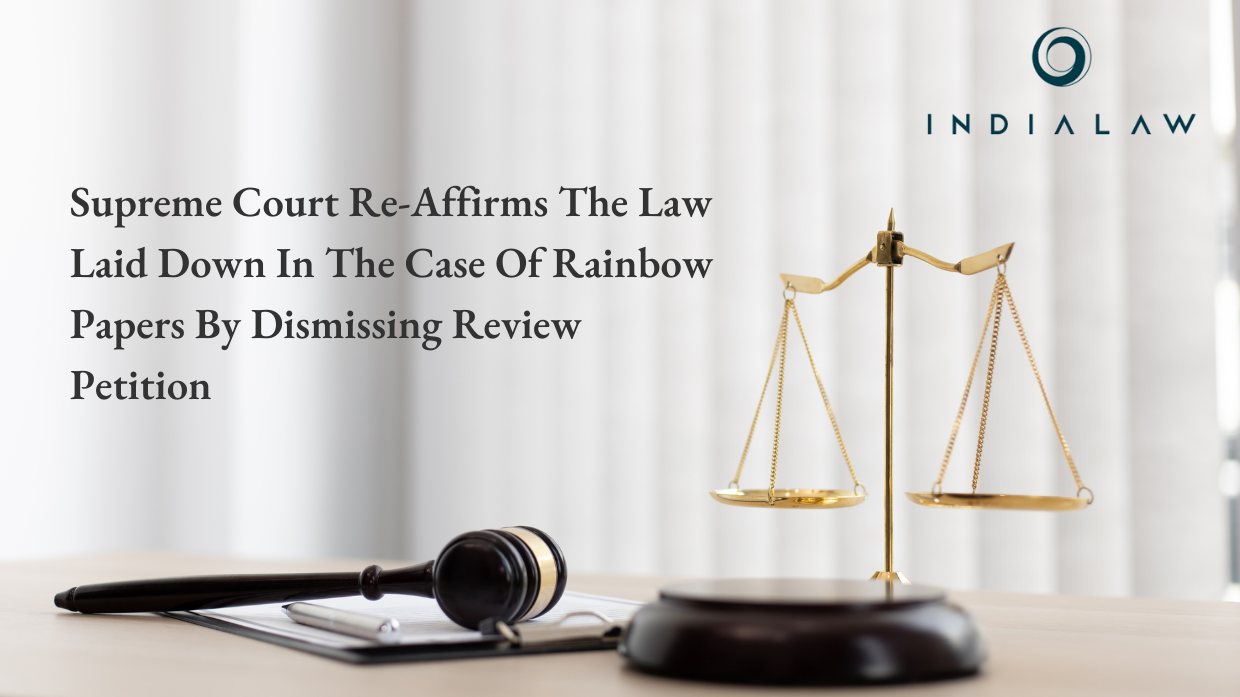Supreme Court Re-Affirms The Law Laid Down In The Case Of Rainbow Papers By Dismissing Review Petition

Introduction
The recent judgment of the Supreme Court comes as a major drawback to lenders as the Court dismissed the Review Petitions filed by the Lenders seeking review of earlier judgment passed by the Court. In the said judgment, the Supreme Court considered tax authorities as secured creditors. The Court took into consideration the waterfall mechanism and other provisions of the Insolvency and Bankruptcy Code, 2016, (IBC) while concluding at its judgment to decide the priority of distribution of sale proceeds of assets, etc.
The Supreme Court Bench comprise of Justices Aniruddha Bose and Bela M. Trivediconsidered five Review Petitions filed against the 2022 judgment in State Tax Officer v. Rainbow Papers Ltd.[i] passed by Justices Indira Banerjee (since retired) and AS Bopanna.
Table of Contents
Section 53: The heart and Soul of IBC
It deals with the mechanism for the distribution of assets under the liquidation of the company. The procedure is laid down under the IBC and called “Waterfall Mechanism”. In this mechanism the sum of stakeholders in a sequential manner designates the priority of payment that will be distributed from liquidation. U/s 53 of the IBC, the payment priority is first given for Insolvency Resolution Process Cost and Liquidation Cost. The workmen’s dues for 24 months preceding the commencement of the liquidation and debts owed to secured creditors in the waterfall mechanism are treated equally at the second position. Whereas the Operational Creditors and Government Dues are placed fairly low in the waterfall mechanism as compared to Financial Creditors.
Sanjay Kumar Agarwal v. State Tax Officer & Anr.[ii]: Case Analysis
Review Petitions were preferred by the State Tax Officer to seek review of the Judgment dated 06.09.2022 passed by the Supreme Court. The review petitions filed by the lenders in which they contested that the earlier decision of the Supreme Court was in contravention to the legislative framework and expressed provisions of the IBC.
According to a news article published in Economic Times, the review petition filed by SBI stated that “The impugned judgment disturbs the entire scheme of priority of dues for the distribution of assets. Grave public mischief will result from this since the statutory dues will have to be paid in priority to the dues of banks and financial institutions, which may in certain cases result in nil or negligible payment to the lenders”.
Analysis of Supreme Court’s order
In Rainbow Paper Ltd. Case (supra), the Supreme Court held that Section 48 of the Gujarat Value Added Tax Act (GVAT Act) is not in contravention with Section 53 or any other provisions of the IBC. The Court further clarified that u/s 53(l)(b)(ii) of the IBC, the debts that are owed to a secured creditor also include the State under the GVAT Act and the same must be ranked equally along with other specified debts including workmen debts.
The Court concluded that the State is a secured creditor under the GVAT Act and the definition of secured creditor in the IBC does not exclude any Government or Governmental Authority. As per Section 3(30) of the IBC ‘secured creditor’ means a creditor in whose favour security interest. Security interest could be credited through operation of law.
The Supreme Court had set aside the Resolution plan approved by the Committee of Creditors (‘CoC’) and directed that a fresh Resolution Plan may be considered in the light of the observations made above. The Court had stated, “In our considered view, the Committee of Creditors, which might include financial institutions and other financial creditors, cannot secure their own dues at the cost of statutory dues owed to any Government or Governmental Authority or for that matter, any other dues.”
The Supreme Court ruled that a resolution plan that has been approved by the financial creditor by sidelining the statutory dues and demands that are payable to the State and Union Government or other statutory authorities, such a resolution plan was liable to be rejected.
The Supreme Court observed that the submissions made by the Petitioners’ Counsel that the court in the impugned judgment had failed to consider the waterfall mechanism and other provisions of the IBC, are factually not correct. The court had considered the waterfall mechanism along with the other provisions of IBC to decide the priority for the purpose of distributing proceeds from the sale as liquidation assets. The Supreme Court refused to consider the observations passed by coordinate bench in case of Paschim Anchal Vidyut Vitran Nigam Limited vs. Raman Ispat Private Limited and Others 2023 LiveLaw (SC) 534 on the basis that any passing reference made by the coordinate bench of equal strength cannot be the ground for review.
The Court, while rejecting the review petitions, stated that a well-considered judgment does not fall under the ambit of Review. That the Review Petitioners have failed to make out any mistake or error apparent on the face of record in the impugned judgment and have failed to bring the case within the parameters laid down by this Court in various decision for reviewing the impugned judgment. That the Review Petitions were dismissed by the Court based on the above observations.
Conclusion
In the instant case, the Supreme Court has put Government & Statutory Dues at par with Secured Creditors as against the waterfall mechanism and affirmed its judgement in Rainbow Paper Ltd. Case (supra). Nevertheless, the Ministry of Corporate Affairs vide Discussion Paper dated 18th January 2023 proposes to amend IBC to provide clarity on the treatment of security interests created merely by operation of law as Unsecured Creditors and security interest created pursuant to transaction of the Government Agencies with Corporate Debtor as Secured Creditor under waterfall, which would to a greater extend dilute the chilling effect of Rainbow Paper Ltd. Case (supra) and give major reliefs to aggrieved lenders.
[i] 2022 LiveLaw (SC) 743
[ii] REVIEW PETITION (CIVIL) NO. 1620 OF 2023 IN CIVIL APPEAL NO. 1661 OF 2020
By entering the email address you agree to our Privacy Policy.



